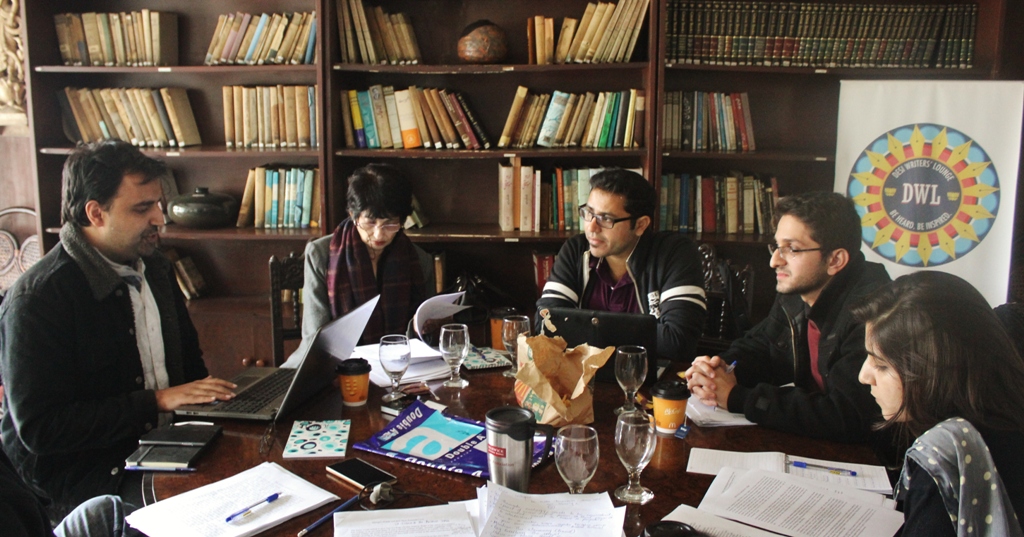Over the next few days, we’ll be uploading videos, photos and a series of posts on writing advice from DWL’s speculative fiction workshop “The Rising Dust”. The workshop was held on December 13 and 14, 2014, in Lahore. In this post, you’ll find a summary of the workshop proceedings, with more information to follow. Stay tuned!

Bilal Shadani (left) speaks as participants and instructor Usman T. Malik (centre) listen during the Sunday session of The Rising Dust speculative fiction workshop in Lahore.
Desi Writers’ Lounge (DWL) successfully started its Canal Side Workshop series in Lahore by organizing “The Rising Dust,” Pakistan’s first professional speculative fiction writing workshop, on December 13 and 14, 2014 at the Nairang Art Gallery.
US-based Pakistani speculative fiction writer Usman T. Malik was the workshop instructor. Malik worked with 11 participants to critique and improve stories written by the participants in the science fiction, fantasy and horror genres. The participants were selected on the basis of their writing samples after an application process conducted by DWL in November. Pakistani bookstore Liberty Books sponsored the workshop fees for two participants.
[South Asian speculative fiction writers] can use indigenous myths and legends to craft better original short stories in the science, fantasy and horror genres
Pakistani novelist Musharraf Ali Farooqi, author of the critically-acclaimed novel Between Clay and Dust, delivered guest lectures at the workshop. US bestselling author Jeff VanderMeer, award-winning editor Ann VanderMeer and literary agent Jennie Goloboy also spoke with the participants via Skype.
The workshop sessions were followed by public talks at the Nairang Art Gallery, in which Malik suggested ways for Pakistani writers to reach out to global publishing markets and improve their storytelling skills.

Usman T. Malik addresses the audience during a public talk on the business side of speculative fiction at Nairang Art Gallery, Lahore.
Writers should not fear rejections from publications, said Malik, whose short stories have appeared in top US and UK magazines including Black Static and Pseudopod. He said writers should look for opportunities where they can workshop their pieces in the company of other writers to improve their writing.
“Don’t be afraid to experiment but be grounded in your craft (of writing) first,” Malik told the participants.
Malik, whose work has been listed for the prestigious Bram Stoker and Nebula Award Reading Lists, said young speculative fiction writers should not shy away from submitting their work to international publications and they can use indigenous myths and legends to craft better original short stories in the science, fantasy and horror genres.
Editors are usually looking for stories that can move readers, surprise them and entertain in new ways — award-winning editor Ann VanderMeer
Farooqi shared with the participants the subcontinent’s tradition of speculative fiction, which encompasses the science, horror and fantasy literary genres.
Farooqi urged writers to read speculative fiction written by local writers in Urdu and regional languages to gain knowledge of indigenous myths, folk tales and legends.

Musharraf Ali Farooqi (right) speaks with participants during the Saturday session of The Rising Dust workshop in Lahore.
In the public talk on storytelling, Malik said writers need to put their heart into their writing.
“Passion comes first, craft comes later,” Malik, who won the Written Backwards Publications DRAWA Inspiration Award for Best New Writer in 2013.
But writers should not ignore the craft or technical skills of writing completely, he said. One way aspiring writers can improve their writing is through reading. He also spoke about characterization, plot and pacing among other writing tips. (More on this in the videos and blog posts will be sharing soon.)
In the first Skype talk, Jeff VanderMeer and Ann VanderMeer shared from their own writing and editing experience with the participants. Jeff VanderMeer said great writing is always a combination of personal artistic vision and something that readers would like as much as possible. Ann VanderMeer said editors are usually looking for stories that can move readers, surprise them and entertain in new ways.

Sunday workshop participants with Usman T. Malik and Musharraf Ali Farooqi. (Back row: left to right) Nihal Khan, Bilal Shadani, Usman T. Malik, Musharraf Ali Farooqi, and Taha Munir (Front row: left to right) Rabia Ahmed, Anam Haq, and Ailya Waqar
Jennie Goloboy, a literary agent at Red Sofa Literary, also spoke to the workshop’s participants via Skype from the US. Goloboy said American or British publishing house would be interested if she contacted them with a manuscript from a Pakistani author.
Goloboy said part of this interest by the Western publishers is in the novelty of South Asian writers. However, she said there is also the idea that people should have access to a larger body of works and they should not be limited to literature from one particular region.
Speculative fiction is a broad genre of fiction that deals with supernatural, horror, fantasy and science fiction. The Rising Dust workshop followed a technique known as the Milford Method in which a workshop’s participants read and critique each other’s works.
DWL promotes and supports new, emerging writers and poets from South Asia through its online writing workshop and literary magazine, Papercuts.



















Pingback: Issue #10: Swedish Futurescapes, Usman Malik Meets Bram Stoker, and A Nutshell Guide to Afrofuturism | SF Around the World